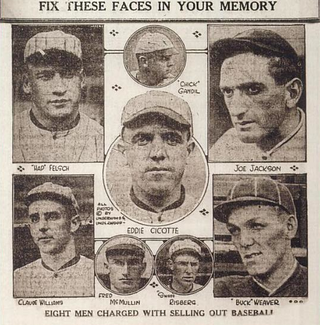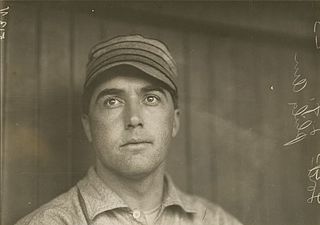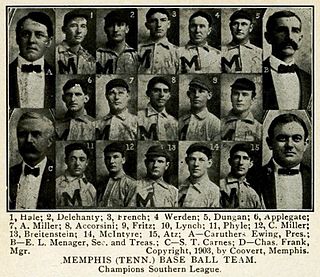
The New Orleans Pelicans or "Pels" were a minor league professional baseball team based in New Orleans, Louisiana.

Joseph Jefferson Jackson, nicknamed "Shoeless Joe", was an American outfielder who played Major League Baseball (MLB) in the early 20th century. Although his .356 career batting average is the fourth highest in the history of Major League Baseball (MLB), he is often remembered for his association with the Black Sox Scandal, in which members of the 1919 Chicago White Sox participated in a conspiracy to fix the World Series. As a result, Commissioner Kenesaw Mountain Landis banned Jackson from baseball after the 1920 season. During the World Series in question, Jackson had led both teams in several statistical categories and set a World Series record with 12 base hits. Jackson's role in the scandal, banishment from the game, and exclusion from the Baseball Hall of Fame have been fiercely debated.

The Black Sox Scandal was a game-fixing scandal in Major League Baseball (MLB) in which eight members of the Chicago White Sox were accused of intentionally losing the 1919 World Series against the Cincinnati Reds in exchange for payment from a gambling syndicate, possibly led by organized crime figure Arnold Rothstein. There is strong evidence both for and against Rothstein's involvement; however, there is no conclusive indication that the gambling syndicate's actions were directed by organized crime. In response, the National Baseball Commission was dissolved and Judge Kenesaw Mountain Landis was appointed to be the first Commissioner of Baseball, given absolute control over the sport to restore its integrity.

Charles Albert Comiskey, nicknamed "Commy" or "the Old Roman", was an American Major League Baseball player, manager and team owner. He was a key person in the formation of the American League, and was also founding owner of the Chicago White Sox. Comiskey Park, the White Sox's storied baseball stadium, was built under his guidance and named for him.
The Southern Association' (SA) was a higher-level minor league in American organized baseball from 1901 through 1961. For most of its existence, the Southern Association was two steps below the Major Leagues; it was graded Class B (1901), Class A (1902–1935), Class A1 (1936–1945), and Double-A (1946–1961). Although the SA was known as the Southern League through 1919, the later Double-A Southern League was not descended from the Southern Association; the modern SL came into existence in 1964 as the successor to the original South Atlantic ("Sally") League.

The Nashville Vols were a Minor League Baseball team that played in Nashville, Tennessee, from 1901 to 1963. Known as the Nashville Baseball Club during their first seven seasons, they became the Nashville Volunteers in 1908 in reference to Tennessee's nickname, "The Volunteer State". The Vols played their home games at Athletic Park, which had been home to the city's professional baseball teams since 1885 and was renamed Sulphur Dell in 1908.

Charles Columbus "Count" Campau was an American professional baseball outfielder. He played in Major League Baseball (MLB) from 1888 through 1894 for the Detroit Wolverines, St. Louis Browns, and Washington Senators. He was the American Association's home run leader in 1890 and was also the Browns' manager for 41 games that season.

Jackson Riggs "Warhorse" Stephenson was an American left fielder in Major League Baseball. Nicknamed Old Hoss, Stephenson played for the Cleveland Indians from 1921 to 1925 and the rest of his career from 1926 to 1934 with the Chicago Cubs. Benefiting from the offensive surge of the late 1920s and early 1930s, he retired with a career batting average of .336, although he was only a full-time player from 1927 to 1929 and in 1932, with injuries and platooning limiting his role for the rest of his career.

Lawrence William Gilbert was an American right fielder in Major League Baseball and a longtime manager in minor league baseball. A native of New Orleans, Louisiana, who broke into baseball as pitcher, Gilbert first became famous as a member of the 1914 "Miracle" Boston Braves.
The 1920 Chicago White Sox season was a season in American baseball.

Bristol Robotham Lord was an American professional baseball outfielder. He played in Major League Baseball (MLB) from 1905 to 1913 for the Philadelphia Athletics, Cleveland Naps, and Boston Braves. Lord is best known for a 1910 trade between Philadelphia and Cleveland in which he was exchanged for Morrie Rath and Shoeless Joe Jackson, who became one of the best hitters in baseball history.

William Gibbon Lindsay was a Major and Minor League baseball player. He batted left-handed and threw right-handed. Lindsay played several positions over his career, including second baseman, short stop and third baseman.

John Joseph Martina, known as Oyster Joe, was an American professional baseball player. A right-handed pitcher and a native and lifelong resident of New Orleans, Louisiana, he spent 22 seasons in baseball, but only one year—1924—in the Major Leagues as a member of the world champion Washington Senators. He won 349 minor league games, with 277 defeats charged against him.

Charles Vedder Sitton, also known as Carl, C. V. and Vet Sitton, was a baseball player and coach. He attended Clemson College, where he also played football, and later coached baseball for the Tigers.
Thomas Carl Stouch was an American Major League Baseball second baseman who played four games with the Louisville Colonels of the National League in 1898. He is best known for "discovering" Shoeless Joe Jackson who played against him while Jackson was in a mill team in Greer, South Carolina in 1907.
The Southern League was a Class B and Class C minor league baseball league which operated intermittently in the Southern United States from 1885 to 1899. Financial problems plagued the league and its member teams throughout their existence. It was not unusual for teams to depart the league during the season or for the league to cease operations without completing the season. It was this lack of financial support which ultimately caused the league to permanently disband in 1889. In 1901, a new league, called the Southern Association, was created from its remnants.

The 1908 Nashville Vols season was the 15th season of minor league baseball in Nashville, Tennessee, and the Nashville Vols' 8th season in the Southern Association. The Vols finished the previous season in last place, but this year won the league pennant, by defeating he New Orleans Pelicans 1-0 on the last day of the season in a game dubbed by Grantland Rice "The Greatest Game Ever Played In Dixie."
The 1905 New Orleans Pelicans season represented the New Orleans Pelicans baseball team in the Southern Association and won their first league pennant, finishing with a record of 84 – 45. An outbreak of yellow fever resulted in a quarantine of New Orleans. The Pelicans were forced to play most of their games out of town. The team was led by pitcher Jimmy Dygert and Otto Williams. The team also included Ted Breitenstein, George Rohe and Erve Beck. Breitenstein went 21–5, and Dygert put up a record of 18–4.

The 1903 Memphis Egyptians season represented the Memphis Egyptians baseball team in the Southern Association and won their first league pennant. The team played its games at Russwood Park. The team was managed by Charlie Frank. The Egyptians were led by pitcher Harry McIntire. Perry Werden led the league in home runs with 8. The team also included pitcher Ted Breitenstein. Both Frank and Breitenstein left for New Orleans next season.
The Savannah Electrics were a minor league baseball team based in Savannah, Georgia.















